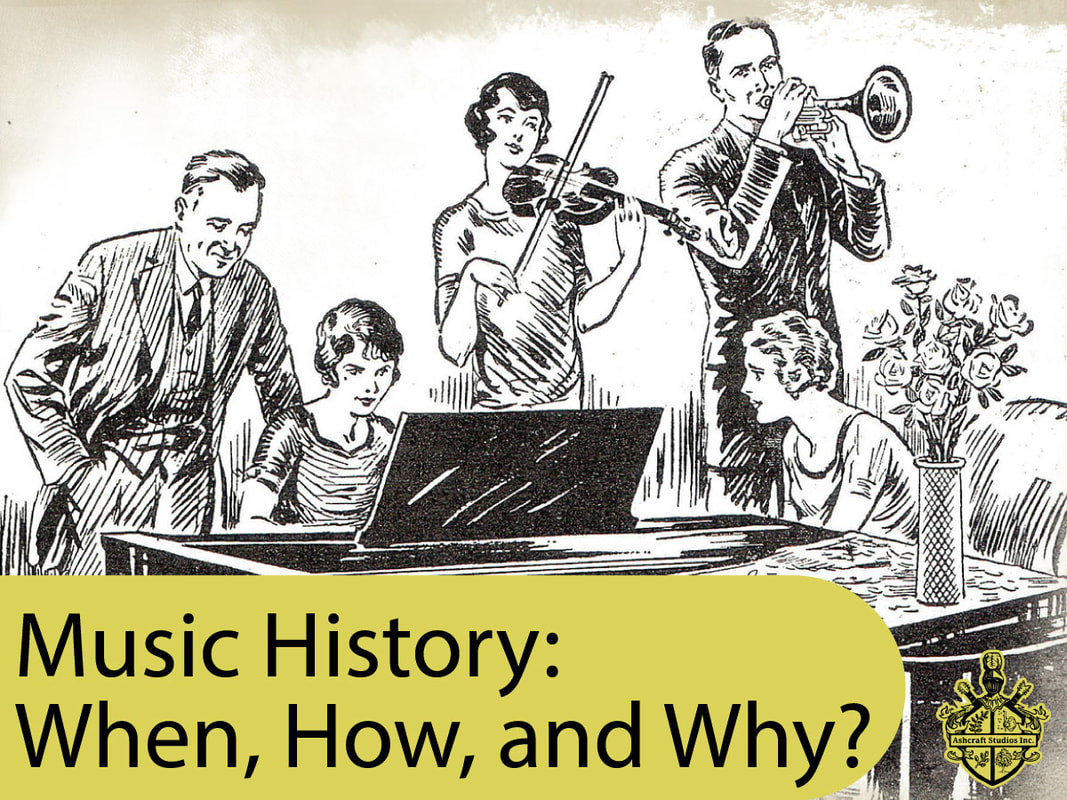|
We’ve spent a good amount of time discussing what music is and what it sounds like, but what we haven’t talked about is where music comes from, how it came to be, and most importantly, why? While historians are unable to pinpoint the exact moment in which music was first created, we are able to glean a basic understanding of music history’s timeline throughout the ages. But before we delve into moments of music history, let’s first review what music is.
What is Music?As we’ve mentioned earlier in previous posts, music is an organized sound characterized by qualities such as volume, timbre, pitch, and duration. According to Jeremy Montagu of the University of Oxford, the early man’s capability to create varying sounds and pitches may suggest music’s existence was born even before language was developed, although hominid motor development may place its beginnings even earlier due to rhythmic capabilities. (Montague, 2017) While it is interesting to speculate on the potential of the humble Neanderthal and early man to create music, evidence and facts reign supreme in the world of historical studies. Here is what we KnowThe earliest instruments are roughly dated to somewhere around 40,000 years ago. Although it is speculated that earlier instruments did exist, however failed to withstand the passage of time due to the high likelihood that the instruments were made with perishable materials. (Barras, 2014) In his article “Did early humans, or animals, invent music?” Colin Barras noted a 43-year old bone flute believed to be evidence of Neanderthal musical activity. The bone, however, may be a product of coincidence as some scientists believe that the holes in the artifact were merely created by a predator enjoying the spoils of its prey. Yet despite the lack of evidence regarding Neanderthal instrumental abilities, the presence of a descended voice box in early fossils provide proof of ancient man’s ability to sing. (Barras, 2014) Music as we know it began to take shape in Medieval Europe as manuscripts and musical notations were being recorded by educated persons. (Naxos, n.d.) Since then music has continued to evolve, it’s development assisted by social changes and technological advancements. Although music has come a long way from primitive rhythms and melodies, the bigger question looms over our heads during this discussion. Why was music created?Unless we build a time machine it’s hard to say exactly why music was created. Was it an accident? Did man-kind just grunt a few pitches or hit a stick on a rock a few times and thought “Hey that sounds good. I think I’ll do that again”? While we will never know why or how, there is evidence to speculate reasons why music became such an important part of human history. Famed English naturalist Charles Darwin once proposed that music was merely an evolutionary trait developed to attract mates much like the way a male bird would tweet sweet seductions to attract a fertile female bird. Although that theory holds little weight in scientific communities today, mainly because of the simple fact that both men and women sing, a researcher at the University of Zurich in Switzerland published a book reporting a correlation between singing primates and monogamous breeding pairs. (Barras, 2014) The reason why is unknown, but it sure does sound romantic doesn’t it? Practical applications of music can also be considered when contemplating the reason for music’s existence. Music is a form of human expression and communication. Anyone who knows anything about music theory can tell you that a major scale will make a person feel happy and a minor scale will make them feel sad. Consonance will put a person at ease and dissonance will create tension. Prior to the advent of human language, what better way to communicate how you are feeling than through music? Mate selection and practical applications aside, it’s a known fact that music has a distinct psychological impact. From affecting moods to expressing emotions music has been a key component of the human psyche since man can remember. We posted a series on how music affects the brain in the past. In short, it creates an emotional reaction in the listeners changing the way we see, hear, and think about our worlds around us. Take a look at the past articles and see how music really affects us. Go ahead, we can wait. Perhaps the creation of music wasn’t an evolutionary feature, or a practical way of explaining something when words aren’t available. Should we consider that as human beings we are naturally inclined to observation and expression as we navigate our daily lives and that maybe music is merely a naturally expression of our inquisitive and creative psyches? What if music exists because we exist? Never miss a thing and join our mailing list today.
Stay Connected. Follow us on Social Media.  
0 Comments
|


 RSS Feed
RSS Feed
